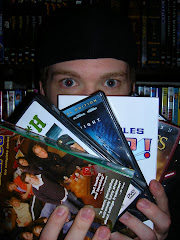 Well, it seems most relevant to watch a movie that I had made reference to in Friday's post. And of course, thanks to TCM's 31 Days I could actually accomplish this goal. No, I didn't watch Soul Man. I'm pretty sure that movie has been buried along with E.T. the Video Game.
Well, it seems most relevant to watch a movie that I had made reference to in Friday's post. And of course, thanks to TCM's 31 Days I could actually accomplish this goal. No, I didn't watch Soul Man. I'm pretty sure that movie has been buried along with E.T. the Video Game.No, what I watched is one of those movies that screams "classic" (for a number of reasons, but I'll get into those later). The first motion picture accompanied with sound, The Jazz Singer introduced us to the "talkie." For most of you, you're probably like I was before seeing this movie, that a talkie meant the entire movie had sound. You would be in the wrong. Only those parts of the movie with actors singing did we actually get the "talking" part. It's hard to trust Wikipedia on this subject, so I'm going to guess that the introduction of sound into movies was rather expensive, much like it is today to have IMAX cameras in use throughout the entire production. Therefore, to cut costs and yet be profitable, only those important parts would actually have sound. The most important parts of the film would most likely be with the actors singing, and that's what you have with The Jazz Singer.
Now that you know what the first "talkie" was like, in terms of... talking, the synopsis is rather simple. In New York, a young Jewish boy Jakie Rabinowitz wishes to be an entertainer - a jazz singer. Father catches him in a jazz hall, and tells the boy he will follow in his father's footsteps, to be a Cantor in the Jewish Synagogue. Boy runs away and the movie moves chronologically to some time later, Jakie is a grown up Jack Robin (Al Jolson) trying to make his name in Hollywood. A few breaks go his way, and he lands in a Broadway revue in New York. Jack goes back home to see his parents. Mom is excited to see her, Father is not. Father still wants him to be a Cantor, but Jack has his heart set on being a jazz singer. Father gets ill, so Jack has to choose between doing the show or replacing his father as Cantor. Jack at first chooses show biz, but chooses to be Cantor for one night. Father professes his love for his son, and passes away as son sings in synagogue. Son does blackface while singing in revue?
Confusing, I know. Throughout the film, Jack sings but without having to paint his face so that he pretends to be an African American. So why does he have to put on blackface on Broadway? I'm guessing it could be explained the show he's doing calls for it, and because blackface wasn't an issue in 1927. Still, it doesn't make sense why he has to do this. Jack is just fine singing without it, and it actually diminishes the appeal for the movie. Without it, it's a fine picture. With blackface, I feel disgusted.
So what did I learn from this movie? A "talkie" doesn't mean there's sound throughout, blackface obviously meant earning more money at the box office in the late 1920s, and Jewish humor always makes a movie that much better. Although I'm not personally Jewish, the SO likes to think I am with the way I always have to pick up change from the ground. Seriously, it adds up! And in this day and age, it can mean a huge difference. I'm just saying...
So The Jazz Singer was something to watch, mostly from the historical aspect and for what it did to the film industry, but it will not need to be included in my DVD collection. At the rate I'm going with watching the films from TCM'S 31 Days, I'll be waking up early for quite a few more Saturdays just to clean out the DVR. But it will be worth it, mostly so I know whether or not I would like to own these movies! Just kidding. Gotta save money for all those Future Purchases...
Just one more post for this weekend to go. And it's a doozy of a film, something that really warms the soul, like a large glass of wine (wink wink). Later!







No comments:
Post a Comment